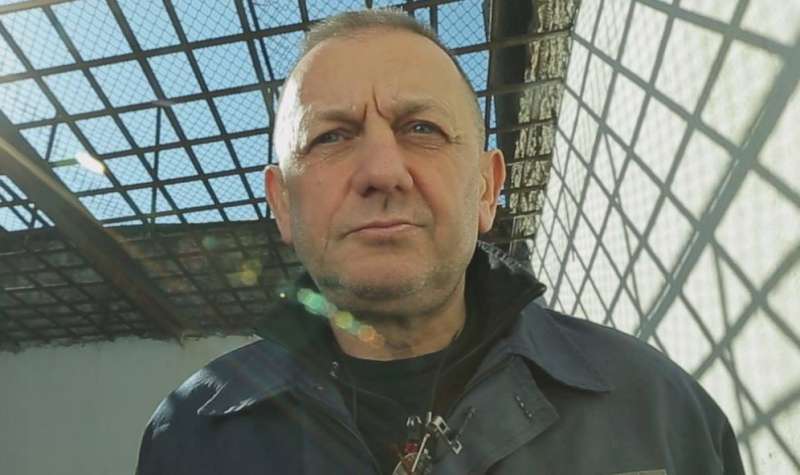Ukrainian life sentence – because they needed to arrest somebody

14 years after a Lviv schoolgirl was killed when a bomb exploded under a local politician’s car, an innocent man is serving a life sentence for the crime, and at least two of the men involved in convicting him have received promotions in post-Maidan Ukraine. Volodymyr Panasenko is certainly not the only victim of gross miscarriages of justice whom Ukraine’s legislators are denying a final chance for justice. His case does, nonetheless, stand out for the cynicism with which a man whom nobody believed to be guilty was put on trial and sentenced to die in prison.
It was on 26 October 2006 that 14-year-old Marika Kutsinda was fatally injured when a bomb exploded under the car of Roman Fedyshyn, a Lviv City Councillor and owner of the Shuvar market.
A month after the blast, the police had caught one person suspected of carrying out the attack, and declared another person wanted (he was arrested in 2013), as well as Oleksandr Rudy, who was suspected of being the intermediary between the perpetrators and the person who had commissioned the crime.
Rudy was undergoing treatment for alcoholism in a psychiatric clinic when arrested. He was to sign four different ‘confessions’, and later gave testimony explaining how these were obtained. He first asserted that the blast had been ordered by Fedyshyn himself to improve his political rating. When Roman Sharko, senior investigator for the Lviv Regional Prosecutor’s Office, told him that such a confession would not do, Rudy named Myroslav Bokalo, the person in charge of the running of the market. Sharko didn’t think much of this either, so Rudy then asserted that the crime had been ordered by two men - Bokalo and Volodymyr Panasenko who had created the company behind the Shuvar market together with Fedyshyn. A fourth ‘confession’ mentioned only Panasenko.
Rudy retracted his words in court, stating during the trial, and then at the appeal hearings that Panasenko had had nothing to do with the crime and that it had been commissioned by somebody else. He later also wrote a statement saying that he had given false testimony against Panasenko under pressure from the investigator (i.e. Sharko), with this pressure including beatings and threats that he would get a life sentence himself if he didn’t ). The pressure, he specified, consisted of beatings and threats that he would get life himself if he didn’t give the testimony they demanded.
These shocking revelations were ignored by the court, under presiding judge Stanislav Holubytsky, as were other falsifications in the case. Panasenko’s lawyer Natalya Krisman believes that everything was done to put Panasenko away for life, with neither investigators nor the court even concealing their certainty that Panasenko was innocent. Somebody, however, needed to be ‘found’, and all other candidates had power and were considered untouchable.
It is now 11 years since Ukraine’s first Ukraine’s Human Rights Ombudsman, Nina Karpachova called for a review of Panasenko’s life sentence because of the evident glaring failings in the case. These were noticed in 2016 by independent Ukraine’s first President Leonid Kravchuk, who called the case a court travesty.
This grave miscarriage of justice has been repeatedly pointed out by human rights organizations. In an appeal to President Volodymyr Zelensky and the Verkhovna Rada at the end of August 2019, the Ukrainian Helsinki Human Rights Union and Kharkiv Human Rights Group called on them to issue an individual amnesty, saying that in cases of such exceptional lawlessness, there is a need for extraordinary measures.
Panasenko was then 60 and had been imprisoned for 13 years. Despite appeals from civic and human rights organizations and a negative assessment from the Public Integrity Council specifically because of his role in convicting Panasenko, Stanislav Holubytsky had been appointed in 2017 to the Supreme Court where he remains to this day.
Since that appeal, Roman Sharko was appointed to a managerial post in the Prosecutor General’s Office, responsible for overseeing ‘adherence to the law within the National Police’. This extraordinary appointment, it should be stressed, was not because Sharko’s part in falsifying the evidence in the Panasenko case was not known. Tetyana Panasenko, who is herself a lawyer, lodged a formal submission, detailing Sharko’s involvement in fabricating the case against her father, As well as the above-mentioned use of beatings and threats to force out testimony, Sharko also falsified the protocols of interrogations at pre-trial investigation stage and prevented Rudy from having access to an independent lawyer during the crucial six days (from 22 to 27 November 2006) when his four confessions’ were being extracted. Human rights groups would have corroborated all the details provided in the submission, but were not asked, although the details should have been damning enough to preclude Sharko’s new appointment even in the unlikely event that Sharko had neither earlier, nor later, used the same methods to obtain false testimony in other cases.
A bill (No. 2033a) providing the chance of judicial review in cases like that of Panasenko was tabled in parliament back in June 2015, and even passed its first reading, before stopping. A new bill (No. 3078) for the new parliament was tabled in February 2020, and is even formally on the agenda, only nobody is in a hurry to consider it. This is almost certainly due to heavy lobbying from those among the enforcement bodies who know how many officers would be implicated by such reviews. President Zelensky has other options, but is also not doing anything.
And Volodymyr Panasenko is 61 years old and has already had 14 years taken from him. We rightly condemn Russia for sentencing Crimean Tatars and other Ukrainians to 14, 15 or even 20 years on totally fabricated charges, yet are doing nothing when it is Ukraine’s authorities that are imprisoning a man who has committed no crime.





